- Home
- Howard, Bob
The Infected Dead (Book 2): Survive For Now Page 3
The Infected Dead (Book 2): Survive For Now Read online
Page 3
The man in charge answered that private boats were to be told to let them pass and then to follow. When they were far enough downriver away from the populated part of town, they could try to set up a screening process. Anyone who was not bitten could remain with the group. Any boat that was even carrying a bitten passenger would stay behind or be sunk.
The officers in charge on each boat then tuned their radios to the same channels and did sound checks. They were given call signs by the officer in charge and one by one they idled their engines a little higher and steered toward the center of the river.
They kept their speed low at first, and all of the boats were dark with the exception of one red running light on the bow. The river was eighty to one hundred yards wide and was fairly deep even along the banks. If they stayed in the center, they should be able to see trouble before trouble saw them. That was when bullets started flying over the boats. Tom said he didn’t know where they were coming from until two of their boats began returning fire.
The crew told Tom that the boats were armed with the Ma deuce, or M2 .50 caliber machine guns. They and the M134 mini guns were spitting out four thousand rounds a minute and quickly silenced whoever was shooting at them.They were also using tracers, so he could see the eerie glow of every fifth bullet as they streaked toward the boat landing.
Tom said that he and Molly were just trying not to be in the way, and there were no words to describe the gratitude he felt to the men and women who had snatched them from the jaws of death. He told us he remembered having that thought, and the phrase seemed so appropriate to describe the hideous creatures that were shambling toward families on the bridge. The screams had blended into one high pitched sound that didn’t begin to die down until they were out of sight from the bridge.
Tom looked like he had reached his limit for one night, and all of us could see it. The man looked completely exhausted. I had a feeling that one more beer would put him under the table.
“Tom,” said Jean, “you and Molly both need sleep. Finish your food while we get a room ready for you.” She mussed up Molly’s hair as she left the table, and Molly gave her a little giggle.
……
Once we had our new friends settled in for the night, the four of us returned to the living room. We had gotten into the habit of spending time talking over the daily events. It was usually just a social gathering because there hadn’t been anything significant happening for a while, but we also used the time to talk about strategies and the future.
We had a roof over our heads, weapons, clean clothes, and food, but we always remembered what Uncle Titus had told me about thinking like a survivor. We had to continually remember that it could all be taken from us if mistakes were made. We also had to remember that our supplies, while plentiful, were not infinite.
Taking in a child and her father was not going to impact our supplies to a great extent, but we had been toying with the idea that we could hide our heads in the sand and ignore what was happening in the real world, or we could be proactive and prepare for the time when we would be forced out of Mud Island. As I had said to my friends before, it’s like shucking an oyster. You have to pry at them to get them open, but sooner or later the oyster gets opened and gets eaten. That was one reason why we had also started monitoring the shortwave broadcasts continually.
Tonight’s social gathering was like putting closure on the idea that we could just sit tight and wait until this all blew over, but we needed to know more from Tom about what was happening on the mainland. He wasn’t in any shape to go on, though, and we were all left with the same question. How bad was it if a dozen boats carrying well-armed men and women didn’t make it through safely with Tom and Molly?
The Chief broke the silence as we settled in on the couch and a couple of recliners. When you considered what was happening in the rest of the world, we certainly couldn’t complain. We didn’t have the opportunity to give Tom a complete tour before showing him to his room, but there was no doubt he would be amazed when we showed him the rest of the place.
“So,” said the Chief, “anyone want to take a guess about what happened? How did they wind up here?”
“I don’t follow you,” said Kathy. “I’m sure Tom will have a lot more to tell us when he wakes up. Something must have gone terribly wrong for over seventy police officers and soldiers to not make it out, but one man and his child did.”
“That’s not what I’m getting at, Kathy. How did they get here, not how did they survive?”
Now it was my turn to be confused, and Jean didn’t look like she was doing much better. She had deep frown lines on her forehead and was eyeing the Chief like he was an alien.
I said, “Chief, you’re getting all of us worried. Are you having a stroke or something? You sound like you’re saying the same thing twice. How did they get here, and how did they get here?”
“Oh, now I see why everyone’s looking at me like that,” he answered. “I’m asking, how did they get from the Waccamaw River, which is to the west of Highway 17, over to the east of Highway 17? The last time we saw Highway 17 it was the Infected Dead Memorial Highway.”
All of us were intimately familiar with the coastal rivers and the main highway that ran parallel to the Waccamaw River. The four of us had made two insane trips by plane and boat away from the safety of Mud Island. We made it out and back by a combination of crazy luck and teamwork.
The Chief continued, “The Waccamaw River is about one hundred and twenty miles long. One hundred of it is in South Carolina, and it goes past us right through Georgetown. So, Tom and Molly either got off the boat before Simmonsville or after Georgetown, but there’s no way they could have gotten off in between and then made it across Highway 17.”
“I can’t imagine how they could have gotten past Simmonsville on land,” I said. “The accident that blocked Highway 17 had those infected dead backed up through Simmonsville. That’s one town that had a population increase after the infection started to spread.”
“And,” Jean added, “if they went as far as Georgetown, how did they get turned around and come all the way back up to Mud Island? As a matter of fact, I can’t wait to hear how they got across the moat to the dock.”
“I imagine the most interesting part of Tom’s escape with Molly is yet to be told,” said the Chief. “Breakfast should be interesting.”
The Chief got up and walked over to a corner of the room where he had been keeping rolled up maps and navigational charts. He searched through the collection until he found the right one and took it to the dining room.
He didn’t say anything, so the rest of us followed out of curiosity. He moved a few things off the table and spread out the map. Kathy sat heavy bowls on two of the corners and passed a matched set to me to do the same on the other end.
The map was longer than the table, but the Chief had everything he needed to see in the middle. He sat a salt shaker on one spot and said, “This is Simmonsville.”
I put the pepper shaker on the map and said, “Here’s Georgetown.”
The Chief reached over and moved it from the city to the bridge over the Waccamaw River. He said, “I think whatever happened, it had to be somewhere between these two places. Here’s the Waccamaw River running parallel to Highway 17.” He ran his finger along the river starting at Simmonsville and ending at Georgetown.
I looked at the land between the river and the highway, and I could see there was no possible way that anyone could have survived trying to walk from the Waccamaw River to Highway 17. There were only three roads going from Highway 17 toward the river, and they didn’t go all the way to the water. The closest of the three was the dirt road that I had traveled to reach Mud Island. It went in the other direction too, but just like on my side of Highway 17, it was a dead end.
The problem was that even if they could have made it from the river to Highway 17, they couldn’t have crossed that highway. It was just too crowded with the infected. As for the woods, they were worse betw
een the highway and the river than they were on our side of the highway. The woods were so dense on that side that a person could be lost in there for days without food and water, and they wouldn’t be able to go more than two feet before they were tangled in the brush. It was that bad even without the infected trying to get through there themselves. It really was no wonder that the infected stayed on the main roads. They were following the path of least resistance.
“That’s only about a ten mile stretch of road,” said the Chief, “but any open ground gets you spotted by the infected dead, and trying to go through the trees would be impossible.”
“So, that leaves going around, either above Simmonsville or below Georgetown,” said Kathy.
Jean added, “And Simmonsville is the capital city of the infected dead, so it had to be Georgetown.”
I was listening to them, but I was really stuck on the question of crossing the moat more than I was on how they got to our side of the highway. Regardless of which way they had come, they had managed to breach our best security barrier.
“Guys,” I interrupted, “we have a problem. I know Tom just got to sleep, but we need to find out how they got across the moat. If they could do it, then somebody or something else could do it, too.”
“When was the last time any of us went out to the end of the dock?” asked the Chief.
We all looked at each other as if we needed confirmation, but we all knew there was a blind spot on the other side of the houseboat, and the last time any of us had gone that far down the dock was a long time ago.
One of our trips away from Mud Island was to bring back the plane, and we had also wanted to bring back a boat trailer so we could tow the Boston Whaler out of the water and hide it. In the process we had gotten lucky and brought back another boat. It was parked in line with the seaplane across from the houseboat.
When we parked the boat and the seaplane, we had passed behind the houseboat, and as far as I knew, none of us had been near the end of the dock since. We didn’t even go that far out on the dock when we brought Tom and Molly inside.
Kathy said, “I think we can wait until morning to find out, Ed, but you’re right. We have a blind spot behind the houseboat, and we took it for granted because the current was too strong through the entrance of the moat.”
The Chief went back to his stash of charts again and started rummaging through them. He came back with one and rolled it out on top of the first map.
“That’s a navigational chart of Mud Island,” said Jean, “but there’s something different about it. Is there something missing?”
“You’re right, Jean. This chart was made before the jetties were built.”
The Chief put one finger on the map and showed where the jetty would be built across from the northern tip of Mud Island. Where the land ended on the other side of the moat, there were markings and depths that showed there had been a large sandbar pointing straight at the island.
“I’m almost afraid to say it,” said the Chief, “but I think Uncle Titus had all of this dredged when he built the jetties. The moat probably didn’t even have water in it at low tide.”
The moat was what we had unofficially named the body of water that separated the island from the mainland. Most of the small islands along the coast have tidal pools or marsh between them and the mainland, but we had something that looked more like a river. The only way to cross it was by boat, and we had seen countless infected dead disappear under the surface when they tried to cross it.
Jean looked at me and asked, “Did your Uncle have any pictures of the island before the work was done?”
“Not that I know of,” I said. “If he did, they weren’t on the island.”
“Chief, are you saying you think they walked across on a sandbar?” asked Kathy.
“If they did, it means the jetty didn’t keep the sand from getting deposited across the mouth of the moat, and if that’s true there will come a time when the moat won’t be as effective keeping us safe,” said the Chief.
Jean may not have been the technical genius that the Chief was, and she tended to be quiet when we started brainstorming, but she didn’t get through nursing school by being dumb.
She said, “We need to move the houseboat so we can see that blind spot, and I think we might need to move the plane and the boat to the southern tip of the island so they won’t be landlocked at low tide.”
She didn’t notice that we were all looking at her until several moments of silence passed.
She finally looked up and said, “What? Isn’t it obvious to everyone?”
Kathy said, “I don’t think we need to wake Tom up. We know what we’re going to find out there, and it’s just a good thing that we found out before it became too shallow to move the houseboat.”
“That bigger boat we brought back last time out should be able to tow the houseboat, right Chief?” she asked.
“Yeah, but that oyster Ed’s always talking about is one step closer to being pried open and eaten.”
Chapter 2
Revelations
Tom probably would have slept longer, but the smell of fresh coffee, bacon, and eggs was more than he could stand. He appeared at the entrance to the dining room looking like he wasn’t sure where he was. Before he came out of his room we had all agreed that we would give him a chance to enjoy his meal before we assaulted him with our questions about how he got here. Instead, it was more important for him to know how we got here.
Once he was situated at the table with his first steaming cup of coffee in his hands, we began by telling him about how Mud Island came to be. Molly was still asleep, so it was a good opportunity to tell him about the bad things we had seen, too.
Mud Island was literally carved out of an uninhabitable stretch of beach on the coast of South Carolina. My Uncle Titus was a survivalist with money, and the rest of the relatives didn’t even know he had money. That’s likely to be why he had so much. Anyway, he was a survivalist with money, and he used it to prepare for every type disaster he could think of.
Tom asked, “Did he plan for a zombie apocalypse?”
“I doubt it,” I said, “but this shelter and all its trimmings would have been as close as anyone could have gotten to being prepared for zombies. I think he would have done more if he hadn’t died. There were some plans in his safe that showed he was looking at the idea of putting more protection in the woods on the other side of the moat. The plans had a note in the margin that said a wall was pending approval of the government after an environmental impact study.”
“I guess it worked out in my favor that he didn’t finish that part,” said Tom.
“We’ve talked about that, Tom,” said the Chief, “but we’ll get to that after you’re more awake and you’ve had a chance to enjoy your meal.”
Jean and Kathy finished sitting plates down in front of everyone and joined us at the table.
“Wow,” said Tom, “I never thought I would sit down at a table and have another meal without being worried that something was going to come up from behind me and rip into the back of my neck.”
“You and Molly are safe here,” said Jean. “Enjoy your breakfast while we bring you up to speed about what we know. Afterwards, you can do the same for us, but for now we want you to make yourself at home.”
I went on telling Tom about Uncle Titus and the will. The rest of the relatives didn’t even find out about the shelter, the houseboat, the seaplane, or the Boston Whaler which we had safely hidden in a section of the woods near the southern tip of the island.
“When I found the houseboat, I saw the plane and a boat parked across from it,” said Tom. “Do you know what my biggest fear was?”
“That’s an easy question,” said Kathy. “You were afraid of the owners coming home and finding you living in their home. We’ve thought it all out, Tom. We think Uncle Titus left Ed the shelter to live in, and the nice stuff outside was all a distraction. No one would even bother to check the rest of the island if they thought
everything was right at the dock.”
“So,” I went on, “I inherited all of this from my Uncle, and when I came down to look it over, the world went to hell. I drove up to Surfside to get some essentials.”
“Some what?” three people asked at the same time.
Tom looked at the Chief, Kathy, and Jean and saw their accusing grins. Each had stopped eating and were looking at me.
“Okay, let me explain something,” I said. “When I got here, there was no apocalypse in progress. Nothing was on the news about dead people attacking live people and biting them. I was thinking of this place as some sort of beach house without windows, and I was planning on living here. My uncle left me a wall safe full of money, and I figured I would quit my job and just hang out here until I decided what else to do.”
Tom asked, “Doesn’t that sound a bit unlikely? A shelter conveniently falls into your lap, and we have a zombie apocalypse?”
“Some people would say that,” I said, “but when you think about it, people win lotteries, too. Also, there’s a more realistic answer. All over the world there are survivalists who have built places like this. I doubt anyone knows how many there are, but before the zombie apocalypse, a lot of survivalists grew old and died. I don’t doubt for one minute that there’s another Ed Jackson out there somewhere who’s holed up in a shelter because a survivalist relative left him a rabbit hole.”
“That’s the first time I’ve heard you say that,” said Jean, “and it was well put. You were just the luckiest lottery winner because you got your shelter right before the apocalypse. Someone had to be last, right? Imagine how many rabbit holes might be uninhabited.”
“Now get back to that part about going into town for essentials,” said the Chief. “What was it that your uncle forgot to stock? Was it food, water, weapons, or ammunition?”

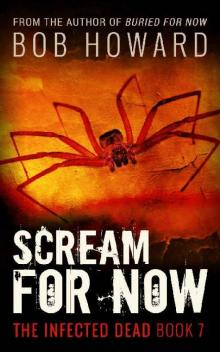 The Infected Dead (Book 7): Scream For Now
The Infected Dead (Book 7): Scream For Now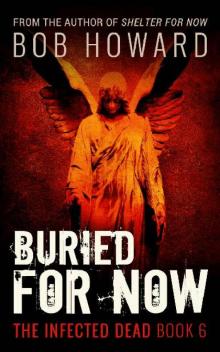 The Infected Dead (Book 6): Buried For Now
The Infected Dead (Book 6): Buried For Now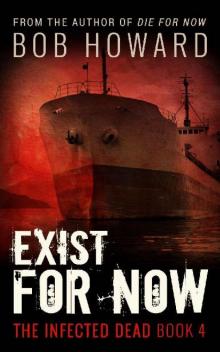 The Infected Dead (Book 4): Exist For Now
The Infected Dead (Book 4): Exist For Now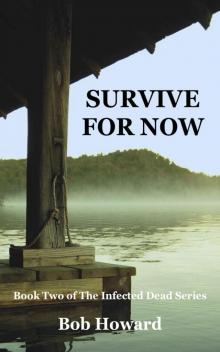 The Infected Dead (Book 2): Survive For Now
The Infected Dead (Book 2): Survive For Now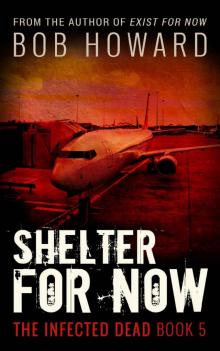 The Infected Dead (Book 5): Shelter for Now
The Infected Dead (Book 5): Shelter for Now